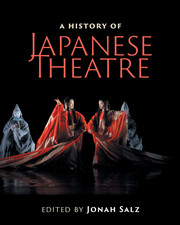Book contents
- Frontmatter
- Contents
- List of figures
- List of tables
- Contributors
- Contributors’ biographies
- Foreword
- Acknowledgments
- Note on Japanese terms
- List of abbreviations
- Timeline
- Editor's introduction
- I Traditional theatres
- Preface to Part I Japanese civilization arises
- II Modern theatres
- Preface to Part II
- III Arcs and patterns
- IV Theatre architecture
- Preface to Part IV Evolution of Japanese theatre architecture
- V Theatre criticism
- VI Intercultural influences
- Epilogue: Frozen words and mythology
- Further reading
- Index
Preface to Part II
Published online by Cambridge University Press: 05 July 2016
- Frontmatter
- Contents
- List of figures
- List of tables
- Contributors
- Contributors’ biographies
- Foreword
- Acknowledgments
- Note on Japanese terms
- List of abbreviations
- Timeline
- Editor's introduction
- I Traditional theatres
- Preface to Part I Japanese civilization arises
- II Modern theatres
- Preface to Part II
- III Arcs and patterns
- IV Theatre architecture
- Preface to Part IV Evolution of Japanese theatre architecture
- V Theatre criticism
- VI Intercultural influences
- Epilogue: Frozen words and mythology
- Further reading
- Index
Summary
Modernity comes to a country in many ways, but for Japan and many countries in East Asia in the nineteenth century, contact with cultures of Western imperialist powers was a major formative element. Japan had seen off its uninvited Western guests in the seventeenth century, but by the mid-nineteenth century these returning visitors represented enormous military power. Beginning with the “black ships” of American Commodore Perry, which in 1853 showed they could anchor in Edo Bay with impunity, Western powers forced Japan to open itself to trade, imposing economically unfavorable and legally humiliating treaties. Between 1853 and 1868, debate raged among the most powerful military houses over how to deal with this very present external threat, and a series of political and military struggles resulted in a transfer of power.
The Tokugawa family, which had ruled Japan from Edo (present-day Tokyo) for more than two and a half centuries, was replaced by a tense oligarchic coalition of samurai from western clans long inimical to the Tokugawa. Mindful of the precarious nature of their power and of the weakness of a divided Japan in a predatory world, they sought legitimization for themselves and a unifying force for the whole country in the imperial institution. Emperor Meiji (the name chosen to designate his reign, 1868–1912) was symbolically “restored” to his rightful place in the state. Political events of 1868 are referred to as the Meiji Restoration; when Japanese mention “modern,” the writer usually indicates the historical process set in train at this time.
As Japan entered her modern era (1868–), her sovereignty as a country was severely compromised by “unequal treaties” and legal extraterritoriality imposed by the Western powers. However, less than forty years later, Japan had vanquished Russia in the Russo-Japanese War of 1904–5, thus defeating one of those very Western powers she had so feared. It was clear to Meiji leaders that strong military forces, which could only be achieved with a strong economy, were key to achieving some sort of parity with Western nations, but what they could not know in advance was how much of Western culture apart from the economy had contributed to their internationally dominant position.
- Type
- Chapter
- Information
- A History of Japanese Theatre , pp. 197 - 199Publisher: Cambridge University PressPrint publication year: 2016



